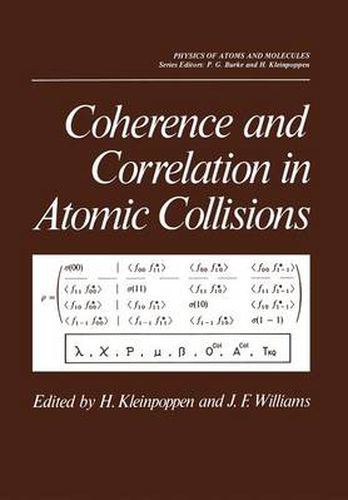Readings Newsletter
Become a Readings Member to make your shopping experience even easier.
Sign in or sign up for free!
You’re not far away from qualifying for FREE standard shipping within Australia
You’ve qualified for FREE standard shipping within Australia
The cart is loading…






This title is printed to order. This book may have been self-published. If so, we cannot guarantee the quality of the content. In the main most books will have gone through the editing process however some may not. We therefore suggest that you be aware of this before ordering this book. If in doubt check either the author or publisher’s details as we are unable to accept any returns unless they are faulty. Please contact us if you have any questions.
H. KLEINPOPPEN AND J. F. WILLIAMS It has only very recently become possible to study angular correlations and coherence effects in different areas of atomic collision processes: These investigations have provided us with an analysis of experimental data in terms of scattering amplitudes and their phases, of target parameters such as orientation, alignment, and state multipoles, and also of coherence parameters (e. g. , the degree of coherence of excita tion). In this way the analysis of electron-photon, ion-photon, atom-photon, or electron-ion coincidences from electron-atom, ion-atom, or atom-atom collisional excitation has led to a breakthrough such that the above quantities represent most crucial and sensitive tests for theories of atomic collision processes. Similarly, the powerful (e, 2e) experiments (electron-electron coincidences from impact ionization of atoms) have attracted much attention where improved experimental studies and detailed theoretical description provide a wealth of information on either the col lisional ionization process or the atomic structure of the target atom. Interference effects, many-electron correlations, and energy and angular momen tum exchange between electrons in a Coulomb field playa decisive role in the under standing of postcollision interactions. New results on coherence effects and orienta tion and alignment in collisional processes of ions with surfaces and crystal lattices show links to relevant interference phenomena in atomic collisions. In small-angle elastic electron-atom scattering the effect of angular coherence can be studied in a crossed beam experiment.
$9.00 standard shipping within Australia
FREE standard shipping within Australia for orders over $100.00
Express & International shipping calculated at checkout
This title is printed to order. This book may have been self-published. If so, we cannot guarantee the quality of the content. In the main most books will have gone through the editing process however some may not. We therefore suggest that you be aware of this before ordering this book. If in doubt check either the author or publisher’s details as we are unable to accept any returns unless they are faulty. Please contact us if you have any questions.
H. KLEINPOPPEN AND J. F. WILLIAMS It has only very recently become possible to study angular correlations and coherence effects in different areas of atomic collision processes: These investigations have provided us with an analysis of experimental data in terms of scattering amplitudes and their phases, of target parameters such as orientation, alignment, and state multipoles, and also of coherence parameters (e. g. , the degree of coherence of excita tion). In this way the analysis of electron-photon, ion-photon, atom-photon, or electron-ion coincidences from electron-atom, ion-atom, or atom-atom collisional excitation has led to a breakthrough such that the above quantities represent most crucial and sensitive tests for theories of atomic collision processes. Similarly, the powerful (e, 2e) experiments (electron-electron coincidences from impact ionization of atoms) have attracted much attention where improved experimental studies and detailed theoretical description provide a wealth of information on either the col lisional ionization process or the atomic structure of the target atom. Interference effects, many-electron correlations, and energy and angular momen tum exchange between electrons in a Coulomb field playa decisive role in the under standing of postcollision interactions. New results on coherence effects and orienta tion and alignment in collisional processes of ions with surfaces and crystal lattices show links to relevant interference phenomena in atomic collisions. In small-angle elastic electron-atom scattering the effect of angular coherence can be studied in a crossed beam experiment.